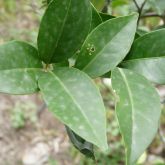Citrus powdery mildew
Alert
Have you seen Citrus powdery mildew?
Be on the lookout and report signs to Biosecurity Queensland on 13 25 23 or contact the Exotic Plant Pest Hotline on 1800 084 881.
Early detection and reporting are key elements in controlling Citrus powdery mildew.

Early symptoms of citrus powdery mildew on leaves
© Photo courtesy of S. Hardy, New South Wales Department of Primary Industries

Citrus powdery mildew on leaves
© Photo courtesy of S. Hardy, New South Wales Department of Primary Industries

Young citrus fruit covered with white 'powdery' spores
© Photo courtesy of S. Hardy, New South Wales Department of Primary Industries

Tree dieback caused by citrus powdery mildew
© Photo courtesy of N. Donovan, New South Wales Department of Primary Industries

Powdery mildew infected leaves can become distorted, leading to withering and defoliation
© Photo courtesy of A. Beattie, University of Western Sydney

The tiny powdery spores of citrus powdery mildew can be transported on people (clothing illustrated), equipment (e.g. pruning tools, mechanical harvesters or hedgers) or vehicles
© Photo courtesy of A. Miles, Department of Agriculture and Fisheries
Citrus powdery mildew is a fungal disease that causes leaf and shoot distortion, premature leaf and fruit drop, and twig and branch dieback. The disease can also be a major problem in citrus nurseries. It has been reported to cause serious damage to mandarins, particularly nursery stock, in Asia.
Citrus powdery mildew is a plant disease and is not harmful to people or animals.
Cause
Citrus powdery mildew is caused by the fungi Oidium citri and O. tingitaninum.
Powdery mildew on other crops, though similar looking, is caused by different species of powdery mildew fungi.
Other names
- Powdery mildew
Description
Leaves
- White 'powdery' spores develop mostly on the upper leaf surface.
- Young leaves turn a pale whitish-grey-green.
- Leaves and shoots can distort.
- Young shoots can wither and die.
- Severe infection causes defoliation.
Flowers and fruit
- White 'powdery' spores develop on flowers and young fruit.
- Infected fruit falls prematurely.
Trees
- Plants can develop twig and branch dieback.
Plant stage and plant parts affected
- Infection usually appears first on new flushing leaves.
- All aerial parts of the plant may be affected.
Distribution
The disease is common in parts of Asia, including South-East Asia (Java, Sumatra). There have also been reports from Uganda, Israel, Central and South America, the United States (California), the Republic of Honduras and Antigua.
Citrus powdery mildew is not known to occur in Australia.
Hosts
All citrus cultivars can be affected. Some cultivars appear more susceptible than others. In India, the citrus varieties that are most susceptible are mandarins, sweet oranges and tangerines.
Impacts
Citrus is a significant crop in Australia, there is over 28,000 hectares of citrus planted and around 1,900 growers. For the year ending June 2017, citrus production was valued at $724.4 million, with Queensland the largest producer of mandarins.
Citrus powdery mildew can cause premature leaf and fruit drop, and twig and branch dieback. Severe infection can significantly reduce tree productivity, fruit quality and yield. Farmers could experience production losses and increased costs associated with managing the disease. Market access could be disrupted.
Backyard citrus growers would also be affected.
How it is spread
This disease produces tiny, powdery spores that can survive on fallen leaves.
The spores can be transported:
- by wind
- on people (clothing, hands)
- on equipment (e.g. pruning tools, mechanical harvesters or hedgers)
- on vehicles.
Movement of infected citrus plant material poses the greatest risk of introducing citrus powdery mildew to Australia. The Australian Government closely regulates approved host plant imports and monitors for illegal plant movement.
Monitoring and action
Check crops often. Look for plants that are unthrifty and that may also have dieback and fruit drop. Examine leaves, shoots, branches, flowers and fruit for white powdery patches of spores and distortion.
If detected, report immediately to Biosecurity Queensland.
Prevention
The key method of preventing citrus powdery mildew from entering your farm is to use certified disease-free planting material and have robust on-farm biosecurity systems in place.
Find out how you can protect your farm from plant pests and diseases:
Legal requirements
Citrus powdery mildew is an exotic pest of citrus.
Report suspected citrus powdery mildew to Biosecurity Queensland immediately on 13 25 23 or contact the Exotic Plant Pest Hotline on 1800 084 881.
If you think you have found citrus powdery mildew, you must take all reasonable and practical steps under your control to minimise any associated risks. This is called a general biosecurity obligation (GBO).
Further information
Refer to the Biosecurity manual for the citrus industry (PDF, 4MB) and the National Citrus Biosecurity Surveillance Strategy for specific advice on how to monitor for exotic citrus pests and diseases